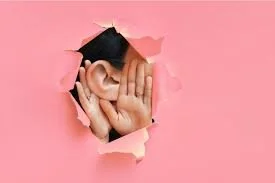Can improv improve our relationships?
Improv has always intrigued me. I'm in awe of jazz musicians and comedians who do improv. In awe with the on-the-spot creativity in front of an audience of strangers. I’m curious how that energy exchange between people is harnessed and shaped into an unrehearsed experience.
In this world of hyper-planning and precision, with so much value put on process improvement, I wondered what I might learn from improv that could be applied to my relationships in my unrehearsed ecosystem called life.
Have you ever had someone ask you a question and you didn’t know what to answer? And wish you had a good comeback?
For years, every Monday morning a well-liked manager would ask me, “What’d you do interesting last weekend?” We’d run into each other in the kitchenette on the second floor of our office building grabbing coffee.
My mind would go blank. What DID I do this weekend? A little fireball in my stomach would light up and spread to my cheeks. I’d stare into my coffee mug. Not making eye contact. Why can’t I remember what I did over the weekend?
It’s as if I was afraid to give the wrong answer. I’d be transported back to grade school with kids staring at me waiting for me to make a mistake.
I’d say something nonspecific to the well-liked manager about being busy with the kids. Walking back to my desk I’d shake my head — next week pay attention and remember something interesting.
It’s not like our relationship was jeopardized because I didn’t have a pithy comment or a good story to tell, but it felt awkward. I felt like I’d failed in some way. I was in marketing and product development, my whole day revolved around creating stories about our products and motivating teams. Why did I trip over myself on the personal side?
It occurred to me recently, I still do that in social situations. Maybe I could learn some suggestions from the art and science of improv.
What happens to our brains when we improvise? Can improv help people who aren’t actors or musicians? Can it reduce our stress, anxiety, and fear of uncertainty? Make us better listeners and more present? And as a result improve our relationships?
how does improvisation change the brain?
As I prepared for this month’s podcast interview with Michael Keefe, a musician friend who enjoys jazz improvisation, I became curious about how he experienced improvisation before and after his not one, but now two strokes. I wondered - what happens in our minds when we improvise?
According to research done in 2008 by neuroscientist and musician Charles Limb and neurologist Allen Braun, different parts of the brain change while improvising and magic happens.
They researched jazz musicians improvising while in fMRI (functional magnetic resonance imaging) machines. It showed how their brains were different while improvising versus when they were practicing predictable scales.
Our inner critics live in the dorsolateral prefrontal cortex and it quieted down in the musicians they studied while improvising. And in the area of their brains that love to play what if, in their medial prefrontal cortex, the activity increased.
What a gift to be able to be in the flow in such an immersive way. To quiet the internal critic and let your creative side get more air time. When writing it’s often like there’s a quiet voice over my shoulder talking smack distracting me. Half the time it’s not even the words, it’s like there’s an attitude that permeates the air around me and like it’s a dog, I throw a virtual red ball over in the corner and say play with that for the next 20 minutes. I’ll listen to you then. We both get distracted and go about our business.
the power of “YES, AND …”
Improv isn’t just for jazz musicians, but stand-up comics too. According to Tina Fey in her book Bossypants, Fey promotes improvisation rules saying they can change your life (work and personal) and reduce belly fat* (*she has a disclaimer regarding the belly fat).
Improv Rule #1: YES, AND. You always agree. During a comedy routine partners go back and forth and feed off each other. If someone says, “Susan took the package,” their partner doesn’t say, “Who is Susan?” The skit would grind to a halt. They’d say something like, “Where did she get the package?” You agree and move the story forward.
According to author and educator Clay Drinko we have a tendency to say no. As humans we find it easier to say no than take the time to understand what someone is trying to communicate to us. Often it’s out of fear of the unknown.
When applied to everyday life, using YES, AND is a refreshing spin to brainstorming where there are no wrong answers as a way to broaden the options. What if we take that attitude with our friends and families too?
“As humans we find it easier to say no than take the time to understand what someone is trying to communicate to us. Often it’s out of fear of the unknown.”
—Clay Drinko
If we remember to keep an open mind to possibilities, maybe some conversations wouldn’t get so heated or shut down before they got started. For me — it’s a positive, helpful, energizing rule to try on in life when I find myself being too restrictive. I consider myself an optimist, but my husband could share many examples where I snap to grid on how something won’t work. Sometimes I can blame it on lack of sleep, but he’s right. I could use more practice honing the skill of YES, AND.
how can we improve improve our listening?
Improv Rule #2: in order to play, YES, AND you have to be able to listen. Improv partners need to pivot or piggyback to keep going with the story, They need to “listen” for clues found in the words and body language of their partners.
We are, I am, so busy multitasking even though I know that really means context-shifting between things. I may make progress on a whole bunch of fronts, but I'm not immune to "not hearing" somebody tell me something while I'm context-shifting and have to a) ask them to repeat themselves, or b) not remember what I nodded my head yes to when agreeing to something.
When I think of listening, I’m reminded of one of the reasons I fell in love with my husband — then boyfriend at 17. He full-body listened to me. I felt like the center of his universe. I felt comfortable enough to tell him things, probably not everything, but there was a relaxed glad-to-spend-time-with-him where I could share whatever thought exploration I was on at the time.
Maybe the art of listening is even more important than YES, AND. Having an improv anticipation mindset as another way to be present. Who doesn't want more of that?
“One of the reasons I fell in love with my husband, then boyfriend at 17? He full-body listened to me.”
by Clay Drinko
If you’ve been feeling lost lately, you’re not alone! Even before the Covid-19 pandemic, Americans were experiencing record levels of loneliness and anxiety. And in our current political turmoil, it’s safe to say that people are looking for new tools to help them feel more present, positive, and in sync with the world. So what better way to get there than play?
how can improvising improve our relationships?
In our entangled relationships, the principles of improv — including the rule of agreement, are about positive, collaborative communication, something extremely important for relationships in our work and personal lives. I wholeheartedly agree with Drinko, “improv can serve as a lens to explore ways to improve our relationships in general, and specifically explore ways to help in the areas of mental health treatment, education, health care, business, tech, and any other field that requires clear, collaborative communication.”
As I reflect, little did I know that my husband and I were practicing improv a decade ago one night at happy hour. A dream project we were working on ran into an impasse. I remember sitting on our couch, my heels kicked off after a long day at work. A glass of Pinot Noir in my hand as we empty-nesters toasted each other. Our dream project to build on the parking lot around the corner where our three daughters learned to ride their bikes came in too expensive. Again.
We needed to take a collective breath to regroup, but couldn’t take too long since we took out loans that weren’t going to pay for themselves.
In parallel, several mansions were slated for demolition around the corner. A woman called that the morning asking us if we could store them on the dream project lot until she could find a permanent home. We laughed it off. What was she thinking?
Then my husband asked a question …
“What if we moved the mansion?”
Back then I didn’t know the rules of improv: #1 YES, AND, #2 listening for your partner’s clues in words and body language.
As I started to laugh at what I thought was a joke, I noticed my husband’s face. Hesitant. Serious. Expectant. His hazel eyes intently on mine.
My head tilted for a moment.
“Okay …”
“And how do you move a mansion?”
The most significant YES, AND I’ve ever engaged in … but that’s a whole ‘nother story. And I bet I had a smile on my face when I told the well-liked manager.
LEAVE YOUR COMMENTS BELOW.
When have you engaged in YES, AND? How has it influenced your relationships? What’s your improv story?
Please leave a comment below and if you enjoyed this post, I invite you to subscribe to my thought echoes newsletter.






